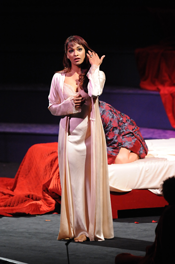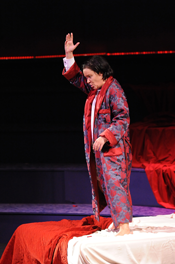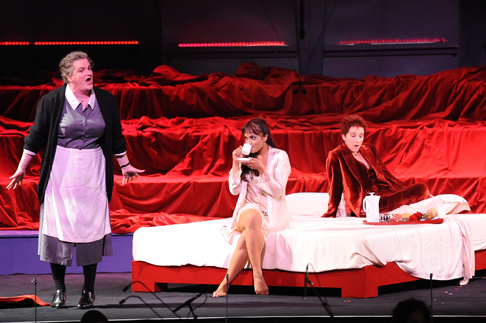Recently in Performances
English Touring Opera are delighted to announce a season of lyric monodramas to tour nationally from October to December. The season features music for solo singer and piano by Argento, Britten, Tippett and Shostakovich with a bold and inventive approach to making opera during social distancing.
This tenth of ten Live from London concerts was in fact a recorded live performance from California. It was no less enjoyable for that, and it was also uplifting to learn that this wasn’t in fact the ‘last’ LfL event that we will be able to enjoy, courtesy of VOCES8 and their fellow vocal ensembles (more below …).
Ever since Wigmore Hall announced their superb series of autumn concerts, all streamed live and available free of charge, I’d been looking forward to this song recital by Ian Bostridge and Imogen Cooper.
Although Stile Antico’s programme article for their Live from London recital introduced their selection from the many treasures of the English Renaissance in the context of the theological debates and upheavals of the Tudor and Elizabethan years, their performance was more evocative of private chamber music than of public liturgy.
Evidently, face masks don’t stifle appreciative “Bravo!”s. And, reducing audience numbers doesn’t lower the volume of such acclamations. For, the audience at Wigmore Hall gave soprano Elizabeth Llewellyn and pianist Simon Lepper a greatly deserved warm reception and hearty response following this lunchtime recital of late-Romantic song.
For this week’s Live from London vocal recital we moved from the home of VOCES8, St Anne and St Agnes in the City of London, to Kings Place, where The Sixteen - who have been associate artists at the venue for some time - presented a programme of music and words bound together by the theme of ‘reflection’.
'Such is your divine Disposation that both you excellently understand, and royally entertaine the Exercise of Musicke.’
‘And there was war in heaven: Michael and his angels fought against the dragon; and the dragon fought and his angels, And prevailed not; neither was their place found any more in heaven … that old serpent … Satan, which deceiveth the whole world: he was cast out into the earth, and his angels were cast out with him.’
There was never any doubt that the fifth of the twelve Met Stars Live in Concert broadcasts was going to be a palpably intense and vivid event, as well as a musically stunning and theatrically enervating experience.
‘Love’ was the theme for this Live from London performance by Apollo5. Given the complexity and diversity of that human emotion, and Apollo5’s reputation for versatility and diverse repertoire, ranging from Renaissance choral music to jazz, from contemporary classical works to popular song, it was no surprise that their programme spanned 500 years and several musical styles.
The Academy of St Martin in the Fields have titled their autumn series of eight concerts - which are taking place at 5pm and 7.30pm on two Saturdays each month at their home venue in Trafalgar Square, and being filmed for streaming the following Thursday - ‘re:connect’.
The London Symphony Orchestra opened their Autumn 2020 season with a homage to Oliver Knussen, who died at the age of 66 in July 2018. The programme traced a national musical lineage through the twentieth century, from Britten to Knussen, on to Mark-Anthony Turnage, and entwining the LSO and Rattle too.
With the Live from London digital vocal festival entering the second half of the series, the festival’s host, VOCES8, returned to their home at St Annes and St Agnes in the City of London to present a sequence of ‘Choral Dances’ - vocal music inspired by dance, embracing diverse genres from the Renaissance madrigal to swing jazz.
Just a few unison string wriggles from the opening of Mozart’s overture to Le nozze di Figaro are enough to make any opera-lover perch on the edge of their seat, in excited anticipation of the drama in music to come, so there could be no other curtain-raiser for this Gala Concert at the Royal Opera House, the latest instalment from ‘their House’ to ‘our houses’.
"Before the ending of the day, creator of all things, we pray that, with your accustomed mercy, you may watch over us."
The doors at The Metropolitan Opera will not open to live audiences until 2021 at the earliest, and the likelihood of normal operatic life resuming in cities around the world looks but a distant dream at present. But, while we may not be invited from our homes into the opera house for some time yet, with its free daily screenings of past productions and its pay-per-view Met Stars Live in Concert series, the Met continues to bring opera into our homes.
Music-making at this year’s Grange Festival Opera may have fallen silent in June and July, but the country house and extensive grounds of The Grange provided an ideal setting for a weekend of twelve specially conceived ‘promenade’ performances encompassing music and dance.
There’s a “slide of harmony” and “all the bones leave your body at that moment and you collapse to the floor, it’s so extraordinary.”
“Music for a while, shall all your cares beguile.”
The hum of bees rising from myriad scented blooms; gentle strains of birdsong; the cheerful chatter of picnickers beside a still lake; decorous thwacks of leather on willow; song and music floating through the warm evening air.
Performances

19 Aug 2008
Prom 18 — L’Incoronazione di Poppea
Glyndebourne Festival Opera’s annual appearance at the Proms is always an eagerly-awaited event, but there is a varying degree of success with which the productions adapt from a full staging at Glyndebourne to a semi-staging suitable for the small platform and cavernous space of the Royal Albert Hall.
Richard Jones’s production of Macbeth last year,
whose big blocks of set and full-chorus choreography didn’t made it to
the Proms, ended up a shell of its former self, and the voices that had
sounded impressively powerful in the intimate Sussex theatre were, if not
lost, then at least diminished in effect when transferred to the Hall.
The fact that Robert Carsen’s production of
L’incoronazione di Poppea was relatively austere to begin
with, starting off at Glyndebourne with little more on stage than a big red
curtain, meant that it was destined from the start to transfer successfully
to the Proms, in a semi-staging by Bruno Ravella.
 Alice Coote as Nerone
Alice Coote as Nerone
The central relationship between Nerone and the upwardly-mobile sex kitten
Poppea was portrayed quite unconventionally. The two began the opera drunk
with lust and longing for one another, but as the drama progressed, it was
clear that Nerone was gradually becoming aware that Poppea’s lust for
power and position had overtaken any genuine love towards him. His resentment
grows to the point that as he promises to make her Empress, he barely stops
himself from striking her – and though he still cannot resist her, most
of the final duet was sung from opposite sides of the stage, with the two
hardly looking at one another. Poppea gets what she wanted, but for Nerone
it’s an empty celebration.
As thought-provoking as it was to see their relationship from that angle
it isn’t a concept that’s borne out by the music. From the very
beginning, we are told in no uncertain terms that it is going to be a victory
for Love over both Virtue and Fortune, and at the end the sinuous
intertwining lines of ‘Pur ti miro’ are clearly a musical
evocation of a couple united in erotic love. Though historical sources relate
that Nero later killed Poppaea by kicking her in the stomach while pregnant,
this is not something that casts a premonitionary shadow over
Monteverdi’s score. It is not even an idea which sits well within this
staging, given the constant presence of Cupid (Amy Freston) as a sort of
master of ceremonies.
In other respects it was a lively performance, with the comic episodes
brought off really sharply. The two Nurses were both sung by men in drag
– Poppea’s nurse Arnalta was the larger-than-life tenor Wolfgang
Ablinger-Sperrhacke, while Ottavia’s nurse, sung by counter-tenor
Dominique Visse, was a more subtle creation, all pursed lips and disdaining
looks. The interchange between the Page (Lucia Cirillo) and the Damigella
(Claire Ormshaw) was brought vividly to life.
 Scene from L’Incoronazione di Poppea
Scene from L’Incoronazione di Poppea
Musically, Emmanuelle Haïm and the Orchestra of the Age of Enlightenment
never let the lengthy score drag, and the cast was very strong, with Alice
Coote’s smoky-voiced Nerone particularly striking. Besides Coote, the
other vocal highlight was Tamara Mumford’s warm-voiced, impassioned
Ottavia, even if Nerone’s complaint about her ‘barren
frigidity’ raised a laugh thanks to Mumford’s advanced stage of
pregnancy. The role of Poppea seems to lie well for Danielle de Niese’s
soft-grained soprano, and she looks wonderful although she does have a
tendency to overact. Only Paolo Battaglia, as Seneca, sounded dry and uneven,
though I did find myself wondering, given the forces – a chamber
orchestra and smallish voices – quite how successful I would have found
the performance if I’d been sitting up in the rear of the Circle or
standing in the Gallery.
Ruth Elleson © 2008


